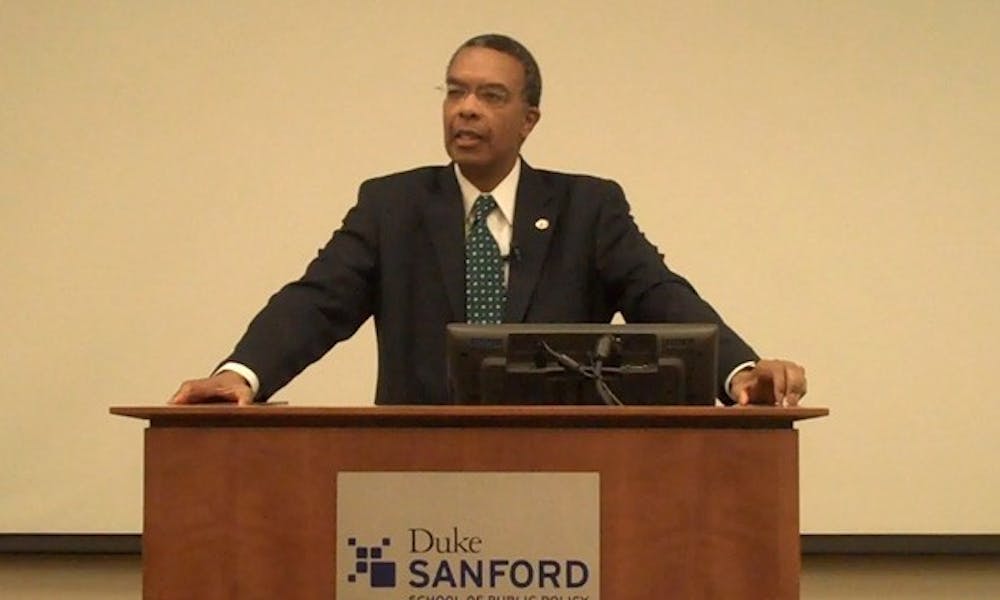As a young man from the South Side of Chicago fresh out of college, Aaron Williams decided to spend two years volunteering in the Dominican Republic for the newly formed U.S. Peace Corps in 1967. Now, more than 40 years later, he finds himself the director of a drastically expanded organization boasting a budget unparalleled in its history.
Williams spoke Thursday afternoon at the Sanford School of Public Policy on the importance of public service and his agenda for the globally known agency. The Peace Corps works to further international development and increase respect and understanding between Americans and the citizens of other nations. (Please see this reporter's Q and A with Williams.)
Williams, who was appointed director of the Peace Corps last July by President Barack Obama, was invited to the University as part of a Corps tour in the Triangle. Rep. David Price, D-N.C., who represents Durham, also spoke to the approximately 50 attendees, sharing a legislative perspective on the Corps.
In his remarks to an audience comprised primarily of ex-volunteers, Williams touted the Peace Corps as “the humanitarian face of America” and implored young people to consider joining the agency.
“We have a chance now... to really carry the torch forward that President Kennedy first handed our country,” Williams said. “We need you, we need your talent, we want your leadership, we want your vision, we want your enthusiasm, we want your passion.”
Williams said he was pleased to be speaking at an institution that places such a high premium on civic engagement.
The Peace Corps is currently active in 76 countries and has taught more than 250 languages to volunteers who bring back invaluable cultural perspectives and experiences to their home communities, Williams said. He also expressed hope for expanding and improving the agency’s programs, adding that the Corps is currently enjoying broad bipartisan support in Congress with a $400 million budget.
“I want to see targeted measured growth,” Williams said. “I want to give more Americans the opportunity to serve in the Peace Corps. We can go into new countries... [and] build on successful existing programs.”
The director added that he plans to create a food security initiative, as espoused by Secretary of State Hillary Clinton, and reach out to young people in host countries to aid in the Corps’ mission.
Today, the majority of Peace Corps volunteers are recent liberal arts graduates who sign up for a three-month training period and a two-year commitment to serve in a foreign country.
Williams said he hopes to increase diversity within the Corps and shepherd the growing organization into the future.
“Volunteers now in the 21st century are very technologically savvy,” he said. “We’re going to create an office of innovation... and look at our [information technology] platform. We’re running to catch up.”
Price spoke after Williams and offered high praise for the new director.
“I’m very satisfied to see [Williams] move into this role, this leadership position, at a time when the Peace Corps’ future, I think, has never been brighter and his role has never been more important,” Price said.
Price added that he supports increased funding for the organization and that he has been working as chairman of the House Democracy Partnership to spread the Corps’ influence around the globe.
“It extends our involvement in the world in ways that work to the mutual benefit of us and friends and neighbors,” Price said. “In the end, it will be our smart power... and our capacity to do good that lead by example and that make for a strengthening of our moral leadership in the world and the esteem in which we’re held.”
Williams’ half-hour speech and subsequent question-and-answer session were organized by Stephanie Alt Lamm, assistant director of Program in International Development Policy. Alt Lamm volunteered for the Peace Corps in Costa Rice in the early 1990s.
Many former volunteers said Williams’ message resonated with them.
“It’s great that with the expansion of the budget comes a person that has been a volunteer, that understands what it’s like to be a volunteer and the things that volunteers might like,” said Rossana Zetina, a former volunteer who served in Antigua and is currently pursuing a masters degree from the PIDP.
Some, like Rebecca Johnson, a second-year masters student in the School of Public Policy and also a former Peace Corps volunteer, also stressed the need for increased recruitment.
“More needs to be done on campuses. [The Corps] wasn’t recruited for on my campus,” she said. “There’s not a huge awareness for it on a lot of levels.”
Get The Chronicle straight to your inbox
Signup for our weekly newsletter. Cancel at any time.

